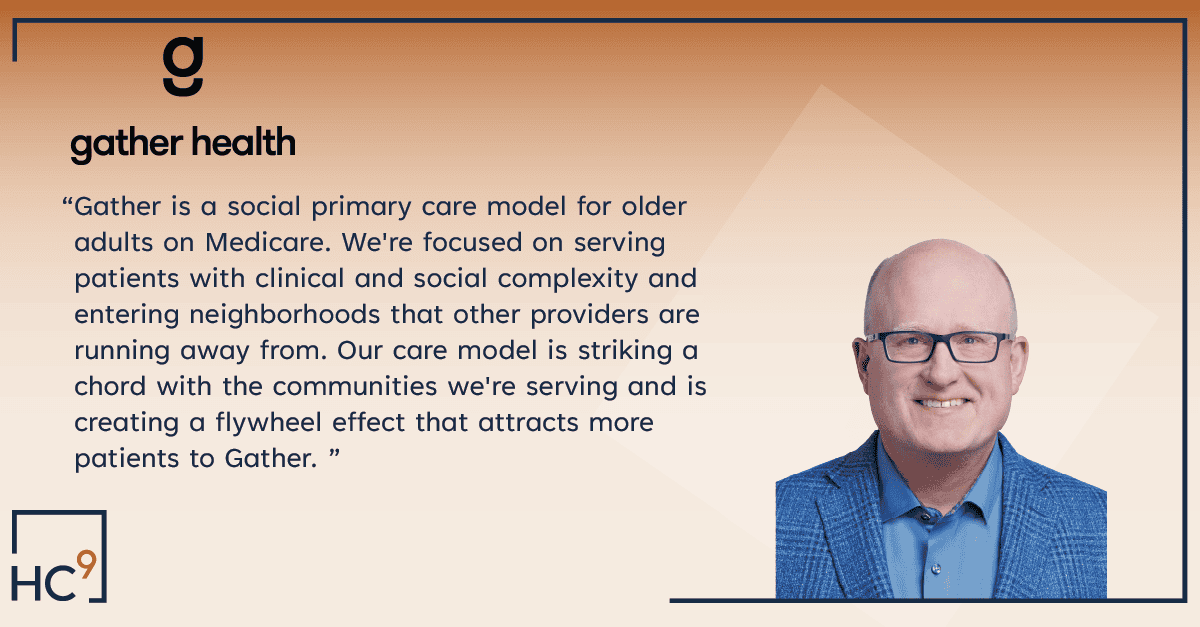
HC9 presents an interview series with portfolio company leaders. We’re interested in how they are solving health care’s biggest problems, what drove them to start a company, and why they chose to work with HC9.
Richard Lungen (Cofounder and General Partner, HC9 Ventures)
Today we are joined by Brent Asplin, CEO at Gather. Brent welcome. Thank you for being here. When did you become CEO of Gather, and how has the concept grown and developed since you’ve been involved?
Brent Asplin (Gather)
I joined Gather as CEO in November of 2022. We were pre-revenue at the time and started seeing patients in the first quarter of 2023.
We continue to see strong growth in the Boston market, where we’ve recently opened three new centers, taking the Boston market from one to four centers.

Richard Lungen (HC9)
What attracted you to the opportunity with Gather, what gap in the marketplace did you see and why were you interested in taking on the role?
Brent Asplin (Gather)
Well, I personally think the original sin of US healthcare is the business model. While working as an emergency physician, I saw up close and personal how a fee-for-service reimbursement system did not give primary care providers the resources they needed to support older adults with multiple chronic conditions.
Gather is a social primary care model for older adults on Medicare. We are focused on serving patients who have both clinical and social complexity. The sweet spot of the clinical model is dual eligible adults, those eligible for both Medicare and Medicaid.
We have three core differentiators that separate us from other providers in the at-risk primary care space.
Our first differentiator is that we focus on building community with our patients, addressing social isolation and loneliness, and then working with partners in the community to address other social determinants, like food and housing insecurity.
We have an epidemic of isolation and loneliness in this country, particularly among older adults. And the data on loneliness and isolation continues to roll in. It’s associated with higher rates of heart disease, earlier onset of dementia and other cognitive disorders, and of course, higher rates of depression.
Medicare spends almost $2,000 a year of incremental spending if a beneficiary is socially isolated. If that beneficiary is socially isolated and widowed, Medicare incurs over $3,000 a year of incremental spending.
The second big differentiator at Gather is that while we agree with others that home-based care is very important for managing populations, most organizations that are doing in-home primary care are sending PCPs to the home. This is great care for the people they get to, but it isn’t scalable across a broad-based Medicare population. Gather turns that care model on its head by sending EMTs and community paramedics to the home, which means we can get to any patient who will allow us in their home.
In my prior work experiences, we never delivered in-home care to more than 4% of our Medicare population. At Gather, we’re closer to 90% of our patients receiving care in the home.
Gather’s third big differentiator is our ability to deploy technology in the home that allows us to collect real-time data and prioritize care management decisions based on real-time data rather than the calendar.
We enroll all of our patients on our care signal platform, which we call Gather Connect. This allows us to get both self-reported data as well as biometric data from connected devices in the home. We have built-in alerts that notify the care team so we can contact the patient in real time and, if needed, go to the home and support them. We’re already seeing that this is allowing us to reduce emergency department visits and hospitalizations.
These differentiators are what sets Gather Health apart. We’re going past the lip service and really addressing social determinants of health, starting with social isolation and loneliness. We’re going to the home in highly scalable ways. And, we’re deploying technology in the home that’s allowing us to manage care using real time data.
Richard Lungen (HC9)
What is the most exciting thing for you about Gather that you’re seeing real time, right now as you’re working with patients?
Brent Asplin (Gather)
I think our social care model is really striking a chord in the communities we’re serving. We’re running to the neighborhoods that others are running away from. We’re bringing people together to address loneliness and isolation, and these events are creating a flywheel effect that attracts more patients to the model.
For example, we just had prom season in Boston where we had senior proms at each of our sub-markets in the Boston area. To see over 250 older adults dancing, having fun, just really having a lot of joy because of Gather is very exciting. It’s very rewarding to listen to our active patients talk to prospective patients about the things they are getting at Gather that they’ve never received before from a primary care provider.
Richard Lungen (HC9)
What’s ahead for Gather in 2025 and beyond?
Brent Asplin (Gather)
Well, the most important milestone in the next year is we are going to move the model to risk in January of 2025.
We will go from a fee-for-service practice to having capitated contracts for both our fee-for-service Medicare patients, as well as our largest Medicare Advantage contract in the Boston market. And that’s really what the model is designed to do, to be at risk. That’s a very important milestone for us. Of course, we’ll need to perform against those risk contracts and continue to add centers as we grow in the Massachusetts market. We also have a pipeline of new markets that we’re working to develop, and we’ll be ready to activate those in the near future.
Richard Lungen (HC9)
You are in the unique position of being both a limited partner of HC9 and now you’re the CEO of an HC9 portfolio company. What was it that interested you in both contexts?
Brent Asplin (Gather)
I really admire the network of LPs at HC9, and I have found the LP meetings to be a very informative venue for both networking and dialogue.
Clearly, there are a number of experienced individuals who can be helpful to a company like Gather, whether that’s on the payor or contracting front or other questions tied to scaling or fundraising. There’s just a lot of good relationships, some of them pre-existing and others that I’ve now met as an LP and portfolio company CEO with HC9.
At the end of the day, the network is what’s really attractive. Our earlier round investors, Khosla and Maverick, were both looking for a new investor to come in that could truly be a strategic partner as we scale the company, and everyone’s excited to have HC9 on board.
About Gather Health:
For more information visit www.gatherhealth.com

